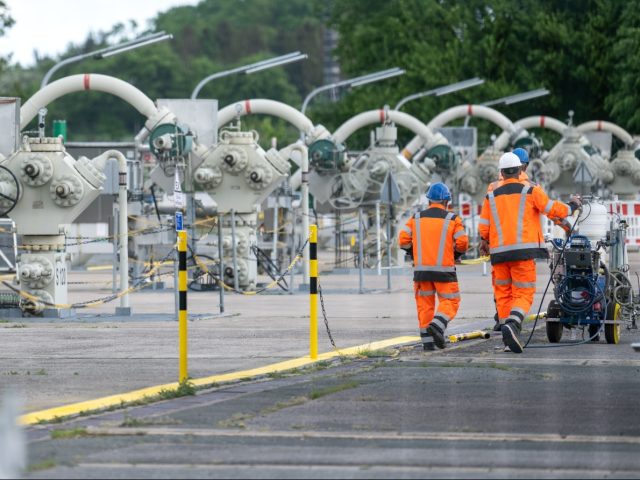Officials in Russian gas-addicted state Germany appear to be starting to sweat as the Kremlin turns down its supply to the country over what it describes as technical issues.
Russian state gas provider Gazprom has announced that it is dramatically reducing the amount of gas being sent to Germany from Thursday on, a move which appears to have upset a number of the country’s officials.
A long-time addict to the Kremlin’s energy supply — despite very clear warnings this would do them no good — reports have suggested that Germany faces the prospect of a harsh economic recession should Russia decide to cut off the country from its gas exports.
According to a report by Politico, Gazprom has blamed the reduction in the amount of gas it is supplying to Germany — reducing the daily volume from 167 million cubic meters to no more than 67 million cubic meters — on problems the company is having with two compressors, which they allegedly cannot currently have properly maintained due to western sanctions of Russia.
However, officials in Germany seemingly don’t believe this story whatsoever and are instead saying that the move represents cynical politicking on the part of Moscow.
“The current reports clearly show that the Russian side’s justification is simply a pretext,” said Robert Habeck, Germany’s economy and climate minister, who claimed that the maintenance of the facilities in question are not believed to be under any sanctions.
The Russian move to massively curb Germany’s gas supply comes as Europe struggles to make itself energy independent from the Kremlin, with alternate plans to fuel the continent so far failing to wean countries off of Moscow’s supply.
What’s more, alternative sources of power are actually going offline for Europe, some by design and some not. With spectacular timing, Germany is ploughing on with shutting down its fleet of nuclear power plants, and imported energy is under peril with one Texas plant responsible for supplying the EU with Liquified Natural Gas (LNG) being knocked offline by a fire and explosion.
While the company in charge of the plant expects that partial service will be restored within 90 days, it admits that a full resumption of the plant’s activities is now not expected to occur until “late 2022”.
“It’s a double whammy to the European gas market,” said one gas analyst in regards to the curbed German supply and the Texas plant explosion.
“The combination of the two and the uncertainty that both provide means deliveries into the summer won’t be as high as initially expected… which obviously has repercussions on the availability of gas into the winter,” he continued.
Existing instability in the market has already resulted in nations some nations to try and curb their energy usage.
For example, Italy began enforcing rationing of air conditioning in state buildings last month, limiting the temperature certain government-linked edifices can be cooled to seemingly in the hopes of lowering their reliance on Russia.
Assuming the move initially marked a positive change in the country’s energy situation, recent developments many now mean that such rationing is no longer enough, with it also being confirmed that Russia has cut its supply by a less drastic 15 per cent.

COMMENTS
Please let us know if you're having issues with commenting.